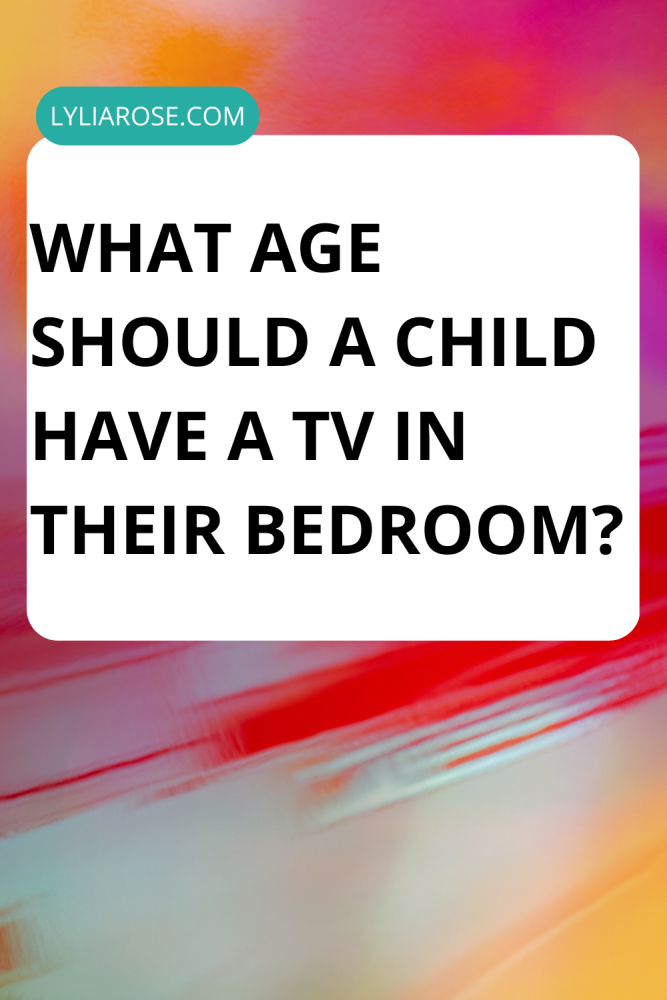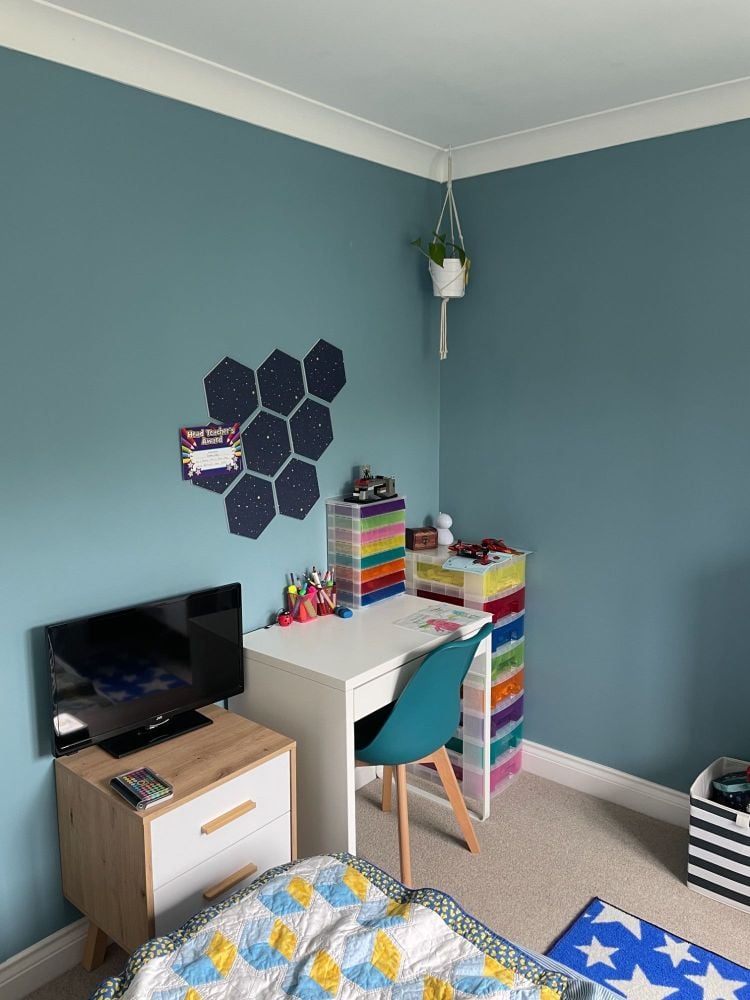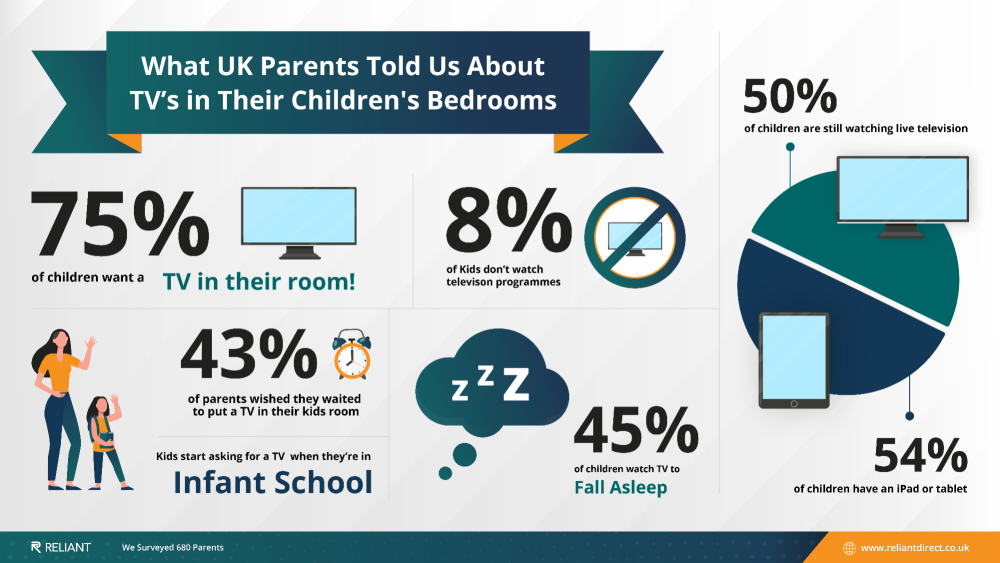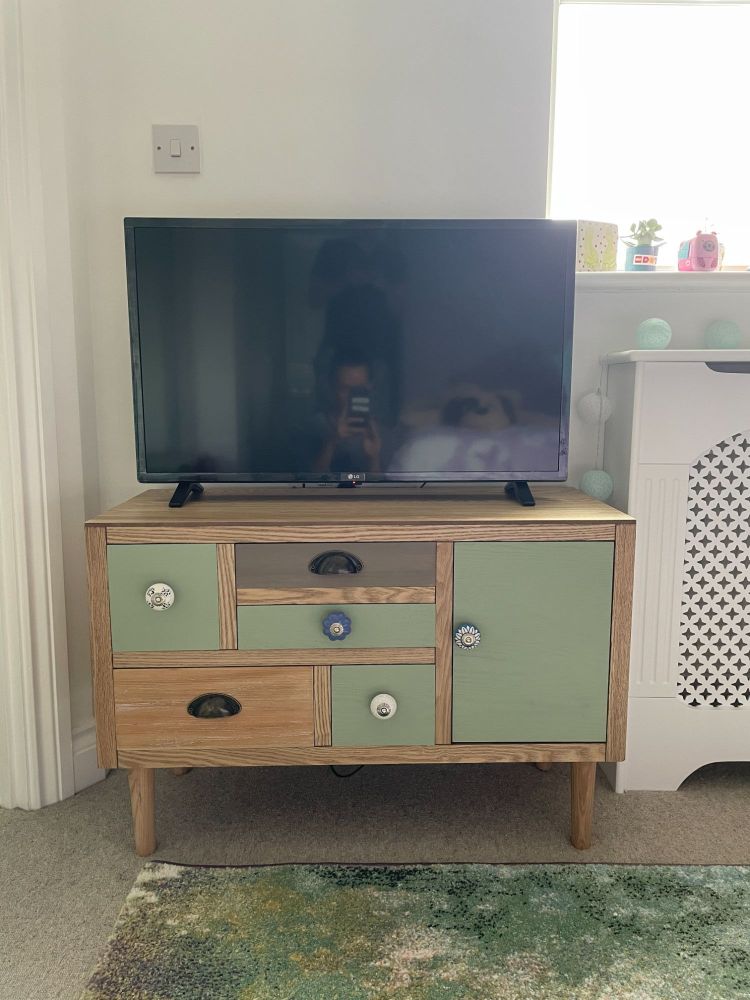What Age Should a Child Have A TV In Their Bedroom?
Posted on
As a parent, you want to give your child everything they need to succeed. You want to provide a comfortable and safe home, furnish their rooms with all the necessary amenities, and encourage their interests and hobbies. But is a TV in the bedroom really necessary? And if so, at what age should a child have a TV in their bedroom?
Deciding whether or not to allow a TV in your child's bedroom is a tough decision, and it's one that requires careful consideration. On the one hand, a bedroom TV can provide convenience and independence for older children and offer the opportunity for educational programming. On the other hand, a TV in the bedroom can also be a distraction from homework and other responsibilities, increase screen time and potentially have negative effects on sleep and overall health, and provide access to inappropriate content.
So, what age is appropriate for TVs in kids' bedrooms? It's not a one-size-fits-all answer. The appropriate age for a bedroom TV will depend on several factors, including the age and maturity level of the child, the quality and content of the programming, and the family's rules and guidelines for screen time. In this article, we'll explore the pros and cons of allowing a TV in the bedroom and discuss the factors to consider when determining the appropriate age. We'll also provide tips for setting boundaries with a bedroom TV to help ensure that your child is getting the most out of their screen time.
TABLE OF CONTENTS:
In this article, we will explore the following topics:
-
Should kids have TVs in their bedrooms? (My personal opinion)
-
What UK parents say about TVs in children’s bedrooms
-
Choosing the right TV for your child’s room
-
What age is appropriate for a TV in a kid's bedroom?
-
The pros of allowing a TV in a child’s bedroom
-
The cons of allowing a TV in a child’s bedroom
-
Tips for setting boundaries with a kid’s bedroom TV

Should kids have TVs in their bedrooms? (My personal opinion)
Aaaah, one of the great parenting debates. Should kids have TVs in their bedrooms? Well, it depends. There are many pros and cons to consider before this can be decided and what may work well for one parent and child, may not work for another. So ultimately, it’s down to each parent to decide what works for them. It’s the same with all aspects of parenting and we should not be quick to judge one another for a different parenting decision. Every family and parenting style is unique and we are all simply trying our best and it seems many parents have different views on TVs in bedrooms!
So what did we do about TVs in our own kids bedrooms?
Well, we have been pretty inconsistent if I’m honest.
Our children first had TVs in their bedrooms when we moved house in the autumn of 2021. We relocated several hours away from anyone we knew and to encourage the excitement of the move, we promised the kids new TVs in their new bedrooms, something they’d never had before.
At the time, the kids were aged 6 and 9 years old and in years 2 and 5. We definitely felt our daughter was old enough and mature enough for a TV in her bedroom but did feel our son was a little too young…
BUT…
These TVs did not come with free rein!
We did not leave the remote controls in their bedrooms permanently and we did still control screen time and when they could watch them. At these ages, we still felt they were far too young to make sensible TV choices and limit their screen time by themselves. So we would often give them the remote controls at weekends only or after school on a Friday.
Sometimes they will get the remote when they have friends over and occasionally in school holidays to snuggle and watch a film in bed for a treat.
Our children are mostly well-behaved and they would never watch the TV late at night, and we didn’t allow them to watch it before bedtime unless a treat during a school holiday, so even if we forgot to take the remotes away one evening, they wouldn’t turn them on (or not that we know of!!)
AND…
Our youngest actually had a temper tantrum one day (he took a while to grow out of them and threw them occasionally, a bad one once a month or sometimes less often), so we actually ended up taking his TV out of his room as a punishment and haven’t yet (he’s nearly 8 now) put it back in. I think it will go back in when he’s around year 5.
JUST TO NOTE…
Our home set up downstairs means we actually have a living room and a separate snug, each with its own TV. This allows us to watch TV in two rooms separately downstairs, so sometimes the kids might be watching something in one room and we adults something boring in the other room. This allows us and our kids greater freedom when it comes to watching TV so we don’t feel the need to let them have so much TV time in their bedrooms. I’m sure if we took away our eldest’s TV, she wouldn’t actually be that bothered.
WHEN I WAS YOUNGER…
I didn’t have this type of family setup or choice. I NEVER had a TV in my bedroom (which I shared with my sister) and we just had one family TV set in the living room for everyone to watch so we had to compromise about what we watched. Back then we didn’t have cable or anything to watch other than kids' TV after school on the main channels and then a couple of hours each morning at the weekend. That was it, there was no 24/7 kids' TV.
HOWEVER…
I would have loved to have had my own room and TV and the privacy and freedom to watch something in peace and quiet on my own, some alone time, or the choice to watch a programme I wanted to watch when others wanted to watch something else I didn’t like. So I do want to allow my children, because we have this option, the freedom to have some independence and freedom with their choices, away from us, especially as they get older and head off to senior school. So we will likely leave the remotes in their rooms once they get to senior school age and teenager age and see how it goes.
OBVIOUSLY…
If their TV habits start taking over and they have little interest in anything else, struggle to get up in the morning or start impacting their homework, attitude or social life, then we will bring in some boundaries when it comes to their TV time in their bedrooms.
ULTIMATELY…
I think it’s all about keeping a healthy balance. Just because a child has a TV in their bedroom it doesn’t mean the parent isn’t being responsible about it and you shouldn’t just assume that child is watching TV 24/7 as it may not be the case.
AND DON’T FORGET…
TV has changed so much since we were kids (I’m a 1985 baby). Our TVs now, in our home, are all smart TVs and they have the internet, YouTube and even Spotify. Sometimes our kids like listening to music on the TV using Spotify or YouTube. Sometimes they do exercise such as JustDance videos which they love. Sometimes they do Cosmic Yoga from YouTube. Sometimes they watch craft tutorials on YouTube or art lessons to learn how to draw new things.
TV is not just TV anymore. It can assist them with crafts, hobbies, and exercise and be so much more educational than it ever was when we were younger and had live TV only.

So... What age is appropriate for a TV in a kid's bedroom?
As we mentioned in the intro, there is simply no one-size-fits-all answer to this question, as the appropriate age for a TV in a kid's bedroom will depend on several factors. These factors may include the age and maturity level of the child, the quality and content of the programming, and the family's rules and guidelines for screen time.
In general, it is recommended that children under the age of 2 do not watch any screen media and that children ages 2 to 5 have limited screen time (less than one hour per day). For older children, the American Academy of Pediatrics recommends limiting screen time to no more than two hours per day.
However, in reality, most kids have watched TV before the age of 2! We certainly tried to only let our eldest watch educational content only such as nursery rhymes, number and alphabet songs, but once our second child arrived this went out the window for him as our eldest adored Peppa Pig and other shows so he basically watched what she did! And that’s just how it goes, especially for those who have more than one child.
When considering the appropriate age for a TV in a child's bedroom, it's important to consider not only the child's age and maturity level but also the quality and content of the programming they will be watching. Parents should also establish rules and guidelines for screen time and monitor their child's media use to ensure that it is age-appropriate and not excessive.

What UK parents say about TVs in children’s bedrooms
Online electronics company Reliant ran a survey asking 680 UK parents various questions about TVs in children’s bedrooms. Here’s what they discovered:
|
How many parents said their children |
75% |
|
How many parents wished they’d waited |
43% |
|
How many kids don’t watch TV programmes? |
8% |
|
How many kids watch live television? |
50% |
|
How many children have an iPad or tablet? |
54% |
|
How many children watch TV to fall asleep? |
45% |
Choosing the right TV for your child’s room
When it comes to choosing a television for your child’s room, then there are lots of factors to consider. If you have decided to put a TV in a toddler, infant or junior’s room, then there’s a chance they may try to draw on it, stick something on it, throw something at it and so on! For a first TV at this age, it would be appropriate to find a cheap preloved set or use an old tv set you have lying around, if you do, so you are not precious about the cost of it and accept it may get damaged.
For older children such as older juniors, preteens and teenagers, you may wish to invest in a higher priced and new TV set such as the latest oled 4k tv so it sees them through their teenage years and beyond, now they can look after it and you can be sure they will treat it well.
To decide on an appropriate age for your child to have a TV in their bedroom, here are some pros and cons to consider:
The pros of allowing a TV in a child’s bedroom
One of the main arguments for allowing a TV in a child's bedroom is convenience and independence for older children. As children grow and become more independent, they may want and be able to handle more responsibility. A bedroom TV can give them the opportunity to watch their favourite shows or movies on their own schedule, rather than having to coordinate with the rest of the family. This can be especially helpful for children who have busy schedules with after-school activities and homework.
Another pro of allowing a TV in the bedroom is the potential for educational programming. While it's important to limit screen time overall, there are many educational programs and shows that can be beneficial for children. By having a TV in the bedroom, children have the opportunity to watch these programs on their own and learn new things.
A TV in a child’s bedroom, when used appropriately, can be a source of comfort or relaxation, especially before bedtime. For example, with a smart TV, you can search YouTube to find meditation for kids to help them drift off to sleep, lullaby music or even a calming bedtime story.
It can serve as a tool for parents to reward good behaviour or incentivise tasks by letting the children have so much time to watch their bedroom TV as a treat.

The cons of allowing a TV in a child’s bedroom
One of the main arguments against allowing a TV in a child's bedroom is the potential for distraction from homework and other responsibilities. If a child has a TV in their bedroom, it can be tempting to watch TV instead of completing homework or other tasks. This can lead to decreased productivity and possibly even lower grades.
Another con of allowing a TV in the bedroom is the potential for increased screen time and negative effects on sleep and overall health. Children who have TVs in their bedrooms may be more likely to watch TV for longer periods of time, which can lead to increased screen time and potentially negative effects on sleep and overall health.
A TV in the bedroom can provide access to inappropriate content. If a child has a TV in their bedroom, they may be more likely to watch shows or movies that are not age-appropriate or that their parents do not want them to watch. This can be especially problematic if the child has unsupervised access to the TV.
If boundaries are not set when it comes to TV time, then it may contribute to social isolation if children are spending more time watching TV instead of interacting with others, as well as encouraging the bad habit of a more sedentary lifestyle.
Tips for setting boundaries with a kid’s bedroom TV
If you decide to allow a TV in your child's bedroom, it's important to establish boundaries and guidelines to ensure that their media use is age-appropriate and not excessive. Here are some tips for setting boundaries with a kid's bedroom TV:
-
Set limits on the amount of daily screen time. The American Academy of Pediatrics recommends limiting screen time to no more than two hours per day for children and adolescents. Consider setting specific times of day when TV and other screens are allowed, and have your child follow a schedule that includes a balance of screen time and other activities.
-
Implement a "TV-free" zone in the bedroom, such as the bed. Encourage your child to use the bed for sleep and other quiet activities, rather than watching TV. Choosing premium mattresses by Winstons beds can make the bed more inviting and comfortable, this can help to establish healthy sleep habits and reduce the risk of negative effects on sleep.
-
Encourage other activities and hobbies. In addition to limiting screen time, it's important to encourage children to engage in a variety of activities and hobbies. This can include outdoor play, sports, reading, and creative pursuits.
-
Monitor and discuss the content your child is watching. Make sure that the programming your child is watching is age-appropriate and that you are comfortable with the content. Consider watching shows or movies with your child and having discussions about the themes and messages. This can be a great opportunity to teach media literacy skills and help your child develop critical thinking skills.
By following these tips and establishing boundaries with a kid's bedroom TV, you can help ensure that your child is getting the most out of their screen time and engaging in a healthy balance of activities.
Final word
Ultimately, deciding whether to include a TV for kids room depends on your family’s unique circumstances and values. While a TV can enhance convenience, independence, and even education, it also comes with challenges such as managing screen time and ensuring appropriate use. Striking a balance is key. With thoughtful boundaries, regular communication, and an emphasis on healthy habits, a bedroom TV can be a positive addition without compromising your child’s well-being or development.
